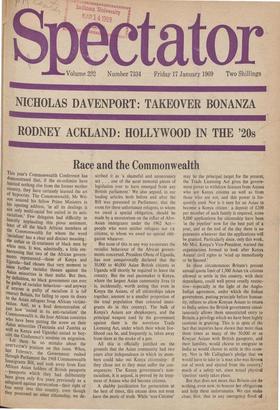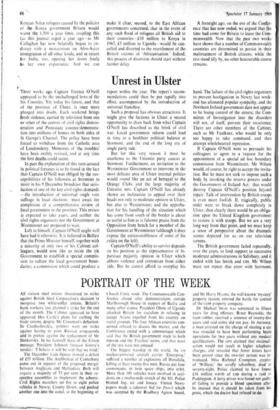Race and the Commonwealth
This year's Commonwealth Conference has demonstrated that, if the ex-colonies have learned nothing else from the former mother country, they have certainly learned the art of hypocrisy. The Commonwealth, Mr Wil- son assured his fellow Prime Ministers in his opening address, 'in all its dealings is not only multi-racial but united in its anti- racialism.' Few delegates had difficulty in heartily applauding this pious sentiment, least of all the black African members of the Commonwealth for whom the word 'racialism' has a clear and distinct meaning : the unfair or ill-treatment of black men by White men. It was, admittedly, a little em- barrassing that two of the African govern- ments represented—those of Kenya and Uganda. chosenchosen that very moment to issue further racialist threats against the Asian minorities in their midst. But then, by definition, no black government can ever be guilty of racialist behaviour—and anyway if anyone is guilty of racialism it is (of course) Britain, for failing to open its doors to the Asian refugees from African victimi- sation. And, as a final demonstration of just how 'united in its anti-racialism' the Commonwealth is, the four African countries Who have been putting the screw on their Asian minorities (Tanzania and Zambia as well as Kenya and Uganda) united to boy- cott the Conference's sessions on migration. Let there be no mistake about the SPECTATOR'S position on this issue. When, last February, the Government rushed through Parliament the 1968 Commonwealth Immigrants Bill, and took away from East African Asian holders of British passports —passports which they had deliberately been given only five years previously as a safeguard against persecution—their right of free entry into this country, even though scribed it as 'a shameful and unnecessary act . . . one of the most immoral pieces of legislation ever to have emerged from any British parliament.' We also argued, in our leading articles both before and after the Bill was presented to Parliament, that the room for these unfortunate refugees, to whom we owed a special obligation, should be made by a moratorium on the influx of Afro- Asian immigrants under the 1962 Act— people who were neither refugees nor UK citizens, to whom we owed no special obli- gation whatever.
But none of this in any way exonerates the racialist behaviour of the African govern- ments concerned. President Obote of Uganda, has now unequivocally declared that the 30,000 to 40,000 Asian British citizens in Uganda will shortly be required to leave the country. But the real pacemaker is Kenya, where the largest Asian community lives (it is, incidentally, worth noting that even in Kenya the Asians, of all citizenships taken together, amount to a smaller proportion of the total population than coloured immi- grants do in this country). The bulk of Kenya's Asians are shopkeepers, and the principal weapon used by the government against them is the notorious Trade Licensing Act, under which their whole live- lihood can be, and frequently is, taken away from them at the stroke of a pen.
All this is officially justified on the grounds that the Asian community had two years after independence in which its mem- bers could take out Kenya citizenship: if they chose not to they must suffer the con- sequences. The Kenya government's non- racialism, it is argued, is proved by its treat- ment of Asians who did become citizens.
A shabby justification for persecution at the best of times, this excuse does not even have the merit of truth. While 'non-Citizens' may be the principal target for the present, the Trade Licensing Act gives the govern- ment power to withdraw licences from Asians who are Kenya citizens as well as from those who are not, and this power is fre- quently used. Nor is it easy for an Asian to become a Kenya citizen : a deposit of £200 per member of each family is required, some 8,000 applications for citizenship have been 'in the pipeline' now for the best part of a year, and at the end of the day there is no guarantee whatever that the applications will be granted. Particularly since, only this week, Mr Moi, Kenya's Vice-President, warned the organisations formed to look after Kenya Asians' civil rights to 'wind up immediately or be banned.'
In these circumstances Britain's present annual quota limit of 1,500 Asian UK citizens allowed to settle in this country, with their dependants, could well prove cruelly restric- tive—especially in the light of the Anglo- Indian agreement, under which the Indian government, putting principle before human- ity, refuses to allow Kenyan Asians to return to India unless the British government simul- taneously allows them unrestricted entry to Britain, a privilege which we have been highly cautious in granting. This is in spite of the fact that inquiries have shown that more than three times as many of the 50,000 or so Kenyan Asians with British passports, and their families, would choose to emigrate to India as would choose to settle in this coun- try. Nor is Mr Callaghan's pledge that we would have to take in 'a man who was throws out of work and ejected from the country,' much of a safety net, since Actual physical 'ejection' rarely takes place. Kenyan Asian refugees caused by the policies of the Kenya government Britain would waive the 1,500 a year limit, coupling this (as this journal urged a year ago—as Mr Callaghan has now belatedly begun to en- dorse) with a moratorium on Afro-Asian immigration of all other kinds, and in return for India, too, opening her doors freely to her own expatriates. And we can make it clear, second, to the East African governments concerned, that in the event of any such flood of refugees all British aid to their countries—£10 million to . Kenya in 1967, £5 million to Uganda—would be can- celled and diverted to the resettlement of the British victims of 'Africanisation.' Indeed, this process of diversion should start without further delay. A fortnight ago, on the eve of the Cookr- ence that has now ended, we argued that the time had come for Britain to leave the Com- monwealth. Now that the past two weeks have shown that a number of Commonwealth countries are determined to persist in their maltreatment of British citizens, while the rest stand idly by, no other honourable course remains.



































 Previous page
Previous page